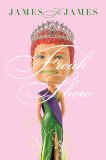My Top 9 for February is up! Going through this site to buy things from Amazon helps me support my habit. (You don't even have to buy what I linked to! Just click over to Amazon from here!)
So, after some x-raying this morning, it turns out that I'm pinching a nerve in my lower back. It's really not fun.
At least I can still read. Last time I messed my back up, they had me on so many muscle relaxants that I couldn't make my eyes focus enough to read. If you're going to be laid up for a week and are unable to read? Ergh. At least Bravo was running a Project Runway marathon that week. I saw all of season one and most of season two, just in time for season two's finale. And! So soon! The season 4 finale! I'm excited.
But, let's talk about some books, shall we? Both books today parallel something happening in the news, sadly, both books deal with some very current events about fear and hate.
This first story hasn't gotten nearly as much press as it should. On February 12, Lawrence King was shot. He died on February 15. He was gay and sometimes wore make-up and women's clothing to school. He was teased and picked on for his sexuality, for "freaking out the guys." So, one Tuesday, his classmate decided to shoot him in the school's computer lab.
Lawrence King was 15. The boy who murdered him was 14.
Although James St. James's book, Freak Show, is ultimately a heart-lifting tale about waving your freak flag, being yourself, and accepting one another, Billy Bloom is horribly bullied for being effeminate. Even when trying to be "normal," he gets it horribly wrong. So, he decides to be his bad-ass drag queen self.
His first period biology classmates beat him into a coma.
The basic plot is that Billy Bloom, gender-bender, cross-dresser, drag queen, queer, and freak, has been sent to live with his all-American father in Florida. He's sent to school with the Stepford children, who think "gay" is contagious. He asks to be transferred to a different biology class (his worst in terms of bullying) but the teacher never noticed there was an issue.
After failing at all attempts to fit in, he gives up and comes to school in full swamp goddess drag. He wakes up 3 days later in the hospital.
After this, everyone has to be nice to him, as the school is hoping desperately his father won't sue.
He decides to run for Homecoming Queen and it turns into a media circus and a lovely tale of the non-popular kids coming out of the wood work and trying to kick some popular ass.
Billy's voice alternates between his dizzying, frenetic, exclamation point riddled highs and his desperate lows when he's hidden himself in the linen closet. But, Billy knows who he is. He isn't always sure how to handle that, but he knows who he is and generally has the attitude that everyone who has a problem with that can go stuff themselves.
It's a great book, but ultimately, not realistic. It's more happy-go-lucky in a sigh inducing David Levithan sort of way.
Because, in the end, Billy Bloom comes off ok. I won't spoil it for you, but I will say it's not a tear-jerker of a novel.
In the real world, Lawrence King was executed in the computer lab. He never even made it to high school.
Walk Across the Sea Susan Fletcher
They were heathens. They didn't speak English. They looked different. They would work for less money than decent, Christian, white folk.
It's Northern California, 1886, and Eliza's father's one of the many townspeople who want to kick the Chinese out of town. But when one young Chinese boy saves Eliza's life, a tentative friendship forms. Eliza sees how her fellow townspeople are kicking the Chinese out--she sees women and old men being dragged from their homes in the middle of the night and thrown onto wagons to be shipped to San Fransisco.
Coupled with her mother's miscarriage, Eliza starts to seriously questions God, the Bible and her father.
With strong parallels to modern immigration debates, Fletcher's tale is gripping and reminds us that we're all human.
Eliza's questioning of why bad things happen to good people is something we've all asked and the answers she finds will not off-put a non-Christian reader, nor will it offend Christians.
Based on true expulsions of Chinese communities throughout the Pacific Northwest, Fletcher's history is well detailed and well researched without over-powering the story. Her author's notes at the end are excellent--clearly outlining her research process and explaining what was fact and what was imagination. I also loved the details about light-house keeping. The ending was perfect too, because it was real.



1 comment:
ugh I've been on reserve for Freak Show since Nov, since my library decided to by one lonely copy. I actually forgot about it until now.
Post a Comment